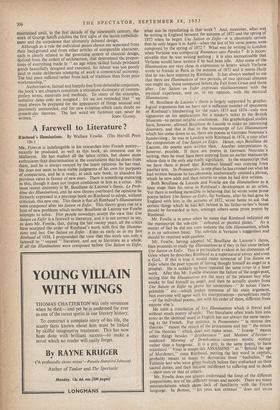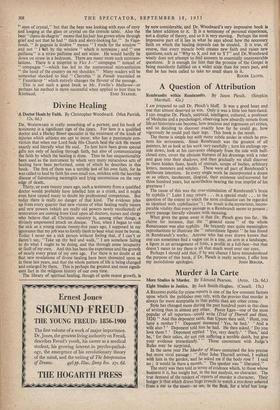A Farewell to Literature ?
MR. FOWLIE is indefatigable in his researches into French poetry— recently he produced, as well as this book, an immense one on Mallarme. He has studied all the latest critics, but shows more enthusiasm than discrimination in the conclusions that he draws from them, and he is always swayed by the latest opinions he has read. He does not seem to have stable judgments of his own for purposes of comparison, and he is ready, at each new book, to abandon his previous views in favour of new ones. There is something endearing in this, though it does not inspire confidence in him as a critic. His most recent discovery is M. Bouillane de Lacoste's thesis, Le Prob. lime des Illuminations, and he now throws overboard the opinions he formerly expressed in a previous book on Rimbaud to adopt, without criticism, this new one. This thesis is that all Rimbaud's Illuminations were composed after his Saison en Enfer. This theory gives rise to a host of new problems which neither Bouillane de Lacoste nor Fowlie attempts to solve. Few people nowadays accept the view that Une Saison en Enfer is a farewell to literature, and it is not correct to say, as does Mr. Fowlie, that, during the last twenty years, all the critics have accepted the order of Rimbaud 's work with first the Illumina- tions and last Une Saison en Enfer. Even as early as in my first Rimbaud of 1938, I propounded the view that this work was only a farewell to " voyant " literature, and not to literature as a whole. If all the Illuminations were composed before Une Saison en Enfer, what was he repudiating in that work ? And, moreover, what. was he writing in England between the autumn of 1872 and the spring of 1873 when he began Une Saison en Enfer—it is absolutely certain that he only began it in April—when the last of his verse poems were composed by the spring of 1872 ? What was he writing in London when Verlaine was composing Romances sans Paroles? It is incon- ceivable that he was writing nothing ; it is also inconceivable that Verlaine would have written if he had been idle. Also some of the Illuminations are very close in expression to letters which Verlaine wrote to friends in Paris in the autumn of 1872 and it seems likely that he was here inspired by Rimbaud. It has always seemed to me that there are Illuminations of two periods, of two spiritual climates one might say, those composed before the Fall from Grace and those after. Une Saison en Enfer ,expresses disillusionment with the mystical experience, and so, in my opinion, with the mystical Illuminations. M. Bouillane- de Lacoste's thesis is largely supported by grapho- logical arguments but we have not a sufficient number of specimens of Rimbaud's handwriting for the years 1873 and 1874—only two signatures on his applications for a reader's ticket to the British Museum—to permit reliable conclusions. His graphologicakstudies have, however, allowed Bouillane de Lacoste to make an interesting discovery, and that is that in the manuscript of Les Illuminations which has come down to us, there are poems in Germain Nouveau's handwriting ; he was in London with Rimbaud in 1874, a year after the composition of Una Saison Enfer. Hence, says Bouillane de Lacoste, the poems were written then. Another interpretation is, however, possible. If there are poems in Germain Nouveau's writing, then he must have been copying from an earlier manuscript whose date is the only one really significant. In the manuscript that we have there is proof that Rimbaud himself was copying from another text. In Promontoire, in one place he has crossed out what he had written because he has obviously inadvertently omitted a phrase, which he now adds and then returns to what he had first written. Both Bouillane de Lacoste and Fowlie see the Illuminations as a later stage than his verse in Rimbaud's development as an artist. Yet there is nothing incredible in believing that he wrote some prose poems before Une Saison en Enli,r, for Verlaine, after he had gone to England with him in the autumn of 1872, wrote home to ask that certain things which he had left behind in his father-in-law's house should be forwarded to him, amongst others some prose poems by Rimbaud. Mr. Fowlie is in error when he states that Rimbaud indicated on the manuscript the sub-title " coloured or painted plates." As a matter of fact he did not even indicate the title Illuminations, which is in an unknown hand. The sub-title is Verlaine's suggestion and should be received with caution. Mr'. Fowlie, having adopted M. Bouillane de Lacoste's thesis, then proceeds to study the Illuminations as if they in fact came before Une Saison en Enfer. This is particularly evident in his discussion of Genie where he describes Rimbaud as a supernatural envoy and even a God. If this is true it would make nonsense of Une Saison en Enfer where the poet repents of having thought himself an angel or a prophet. He is unlikely to have repeated the same error in a later work. After this Mr. Fowlie discusses the failure of the angel-poet, saying that the Illuminations are the story of the peasant boy who awoke to find himself an angel, and then he actually quotes from Une Saison -- Enfer to prove his contention" Je notais l'inex- primable " etc.—which makes nonsense of his main argument. Not everyone will agree with his interpretations—paraphrases really —of the individual poems, nor with his order of them, different from anyone else's. He adds a translation of Les Illuminations which is literal and without much poetry of This literalness often leads him into error as the identical word in English has not always the same mean- ing as the French. For instance, in Promontoire " la rentree des theories " means the return of the processions and not " the return of the theories " which does not make sense. " lvresse " means other things besides " drunkenness " and Matinee d'Ivresse- rendered Morning of Drunkenness—conveys mystic ecstasy rather than a hangover. It is a pity, in the same poem, to have translated " Voici le temps des ASSASSINS " as " Behold the age of Murderers," since Rimbaud, putting the last word in capitals, probably means to stress its derivation from "hachichin," the Fatimite sect who were given hachich before they embarked on their sacred duties, and then became indifferent to suffering and to death —their own or that of others. Mr. Fowlie does not always understand the force of the different prepositions, nor of the different tenses and moods. There are many mistranslations which show lack of familiarity with the French language. In Bottom, " les yeux aux cristaux " does not mean " eyes of crystal," but that the bear was looking with eyes of envy and longing at the glass or crystal on the console table. Also the bear "chenu de chagrin" means that his hair has grown white through grief and not that he had " thick and sorry-looking fur." In Vaga- bonds, " Je gagnais la fenetre " means " I made for the window " and not " I left by the window " which is nonsense ; and " une paillasse" is a straw palliasse and not straw. He would hardly lie down on straw in a bedroom. There are many more such mistrans- lations. There is a misprint in Vies I—" campagne " instead of " compagne "—which has led to the nonsensical mistranslation " the hand of the country on my shoulder." Many readers will be somewhat shocked to find " Cherubin " in Parade translated as " Fauntleroy " which entirely changes the flavour of the passage.
This is not such a good book as Mr. Fowlie's Mallarme—or perhaps his method is more successful when applied to him than to



































 Previous page
Previous page